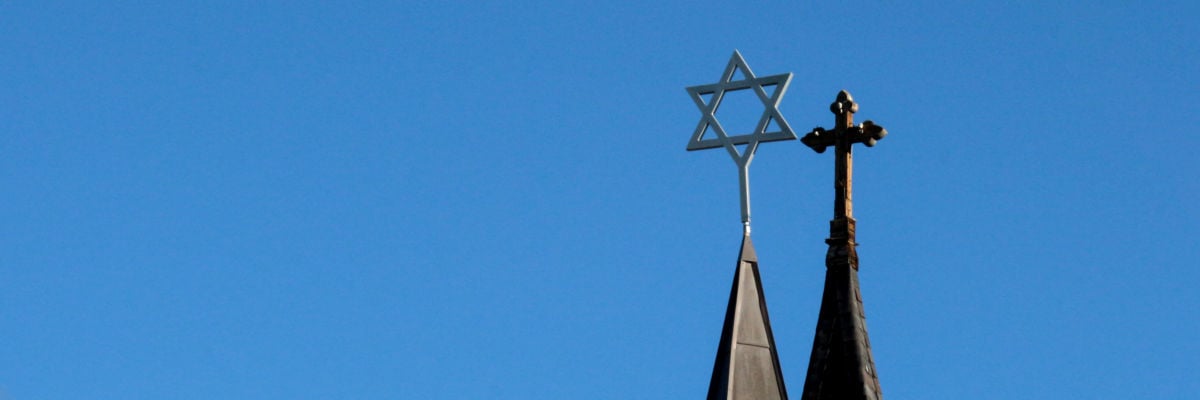
In the Evening Prayer of the 1974 Liturgy of the Hours, on Easter Sunday and throughout its octave, and then again on the third and fifth Sundays of Eastertide, the Church prays,
Let Israel recognize in you [Jesus] the Messiah it has longed for; fill all men with the knowledge of your glory.
The Church desires that Jesus of Nazareth be accepted as the longed for “Christ,” by “Israel”—Israel in the biblical sense, the Jewish people. This implies that they accept the Christian faith, in the context of the Church’s mission to “all men.”
Readers who have followed the debate surrounding the Good Friday Prayer for the Jews found in the pre-Vatican II 1962 Missal may find this surprising, but this is not an isolated case. Even more explicit prayers for the conversion of the Jewish people are found in the Liturgy of the Hours, in the Morning Prayer of December 31 and in Lauds on January 2, and the idea is raised elsewhere.
It is sometimes said that Nostra Aetate, the Second Vatican Council’s “Declaration on the Relation of the Church to Non-Christian Religions,” revolutionized the teaching of the Church on the Jews, to the effect that they should no longer be seen as potential converts. But an even more important document of Vatican II, the “Dogmatic Constitution of the Church” Lumen Gentium (16), reiterates the “command of the Lord” found in the Gospel of St. Mark: “Preach the Gospel to every living creature” (16:15). This mandate is repeated in the 1982 Code of Canon Law (211): “All the Christian faithful have the duty and right to work so that the divine message of salvation more and more reaches all people in every age and in every land.”
The terrible suffering of the Jews at the hands of the Nazis and their allies before and during the Second World War, which took the form of a systematic attempt to eliminate them as a race—genocide, in the most literal sense—certainly had an effect on the way the Church treated the subject of the Jews. This is reflected in the special concern for them in Nostra Aetate (4):
God holds the Jews most dear for the sake of their fathers; he does not repent of the gifts he makes or of the calls he issues—such is the witness of the Apostle. In company with the prophets and the same apostle, the Church awaits that day, known to God alone, on which all peoples will address the Lord in a single voice and “serve him shoulder to shoulder” (Zeph. 3:9).
It behooved the council to underline the fact, familiar from classical theology, that the Jews are a special case, among non-Christian peoples, as the recipients of a revelation whose authenticity is equally recognized by us as Catholics, and that God’s loving concern for them continues. The phrase “he does not repent of the gifts he makes” derives from St. Paul’s Letter to the Romans (11:28-29), but neither Paul nor Vatican II, nor the composers of the new Liturgy of the Hours, nor the editors of the new Code of Canon Law, thought that this meant that the Church’s mission to convert the world did not include the Jews.
In 2007, Pope Benedict XVI liberated the 1962 missal with his apostolic letter Summorum Pontificum, and unexpectedly became caught up in a media storm about a prayer found in that liturgical tradition, used on Good Friday, for the conversion of the Jews. Benedict’s action seemed to merge, in the minds of some elements of the media, with a number of baseless accusations of Nazi sympathies made against Benedict himself, who was a teenager during World War II, and against Pope Pius XII, whose process of canonization had been progressing up to that point. (For a defense of Pope Pius XII, see Catholic Answers articles here, here and here; on Pope Benedict and the Nazis, see here, here and here.)
Pope Benedict wrote a new prayer, to replace the prayer for the conversion of the Jews found in the 1962 Missal, but the new prayer was still clearly a prayer for their conversion: “that they may acknowledge Jesus Christ the Savior of all men,” and this failed to satisfy those who objected to the old prayer simply because it had that intention. Part of the confusion stemmed from the fact that the equivalent prayer “for the Jews” in the 1970 Missal calls for their conversion in a somewhat elliptical way: “that they may continue to grow in the love of his name and in faithfulness to his covenant” and “may arrive at the fullness of redemption.”
The second phrase had been used in the Good Friday prayer for the Jews promulgated in 1965, one of the stages the liturgy went through on the way to the 1969 Novus Ordo Missae. The first phrase, however, replaced a more explicit 1965 version: “that they too may acknowledge Jesus Christ our Lord as the Redeemer of all.” The 1965 prayer, the 1969 prayer, and the prayers of the 1974 Liturgy of the Hours were all overseen by the same team of liturgists under Monsignor (later Archbishop) Annibale Bugnini, and it seems implausible that they accepted, and then rejected, and then re-adopted a traditional theology concerning the conversion of the Jews.
Rather, it seems they wanted to tone down the language of all the Good Friday prayers, which traditionally addressed non-Catholic Christians and pagans, as well as Jews, in rather salty terms: “Look upon the souls deceived by diabolical fraud, that abandoning all heretical depravity, the hearts of the erring may regain sanity and return to the unity of truth,” and “deliver them from the worship of idols.”
In sum, we may ask if the current historical moment is a good one for a targeted missionary effort aimed at the Jews without doubting that the Church has in principle a mandate to convert “all people in every land.”



